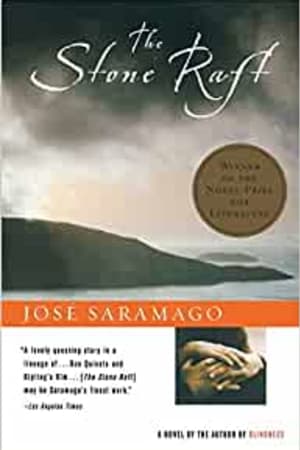Science Fiction
- Publisher : Mariner Books; First edition
- Published : 14 Jun 1996
- Pages : 300
- ISBN-10 : 0156004011
- ISBN-13 : 9780156004015
- Language : English
The Stone Raft
When the Iberian Peninsula breaks free of Europe and begins to drift across the North Atlantic, five people are drawn together on the newly formed island-first by surreal events and then by love. "A splendidly imagined epic voyage...a fabulous fable" (Kirkus Reviews). Translated by Giovanni Pontiero.
Readers Top Reviews
SJ ClassicalEmeAnonL
Pages have colored a bit ... not bad ... but “not good as new” as described. More like VG. Still, I am ok with the purchase.
Martin Mitev
Extremely difficult to read since the author does not respect readers and provides little punctuation. That's his style, like it or leave it.
donyskiw
Saramago's usual humor tells the story of the Iberian peninsula breaking away and floating to sea. The five main characters are on a journey within the bigger journey of Iberia.
Rich Stoehr
"...how all things in this world are linked together, and here we are thinking we have the power to separate or join them at will, how sadly mistaken we are, having been proved wrong time and time again, a line traced on the ground, a flock of starlings, a stone thrown into the sea, a blue woolen sock, but we are showing them to the blind, preaching to the deaf with hearts of stone." This passage, from the last few pages of José Saramago's novel "The Stone Raft," acts as both summation and re-introduction to the story. I can include it here, and even say that it is critical to understanding the nature of the idea behind this book, without giving anything specific about the book away. All of the things that it describes specifically happen in the first chapter or two. The book's themes, present troughout the story, are summed up elegantly above. "The Stone Raft" is an impressive novel, in many ways. It is the second of Saramago's books that I have read, "All the Names" being the first. While I found "All the Names" to be well-written, clever, and imaginative, "The Stone Raft" surpasses it easily. It tackles a difficult concept within the first few chapters, an event which changes the world dramatically. I've found that most writers, when beginning with such a concept, either pull their punches and fail to take their story as far as it could go, or they quickly devolve into trite reiterations of common morality and sentimentality. Saramago does neither. His story is one of fantasy, in many ways, but it is a fantasy based in the real world, and Saramago proves himself to be a remarkably gifted fantasist as he carries his story all the way to the end without faltering. The premise of "The Stone Raft" lies in a seemingly cataclysmic event: the breaking away of the Iberian Peninsula (Portugal and Spain) from the rest of Continental Europe. The peninsula (now an island of sorts) simply fractures off and floats away across the ocean. While the larger story of this and its effect on the rest of the world is told as well, the majority of the book focuses on five people who live on the Peninsula, each of whom feel that they are somehow connected to the breakaway. The story follows their journey as they come together, and then of the relationships that develop between them. Through it all, Saramago remains constant to his purpose; whether telling the story of the floating island or detailing the lives of these five individuals on it, his themes and style are maintained. Mind you, Saramago is not an easy author to read. His themes are challenging, to be sure, but his prose itself is equally so. He writes in long, meandering sentences, embedding key points of story in what might seem at first like a tangent. He eschews the standard grammatical use of quotes and paragraph divisions in his dialogue, so that conversations between characters are r...
Wordsworth
I read The Stone Raft after Blindness and was immensely impressed by both novels. The story concerns the drift of the Iberian peninsula from the rest of Europe. The premise is intriguing as the stone raft sails into the Atlantic heading for God only knows where. It shifts and turns so that North is South and East is West. This crisis brings together the citizens of Iberia challenged to prepare for the possibility the island will slam into the Azores or Canada or the U.S. possibly leaving cities like New York, Boston and Philadelphia inland. The five main characters are brought together by personal miracles and find solace in each other as they witness this drift. I found myself fighting the scientific plausibility of such a phenomenon until I hit this quote: "We're already traveling on a stone raft." Indeed, the planet drifts through the galaxy just as Saramago's stone navigates the currents of the sea. In Blindness I began to realize that Saramago's writing style, devoid of quotation marks, is the grammar of discovery, of a narration of characters trying to find their ways. In Blindness we are challenged to search the text for hints about who is speaking and where the author is venturing. Such a narrative style suits Saramago well as these two novels deal with the search for meaning in a chaotic universe. Such meaning inevitably seems to terminate with the sense we make out of each other. This is a great and wise novel, which I highly recommend.


